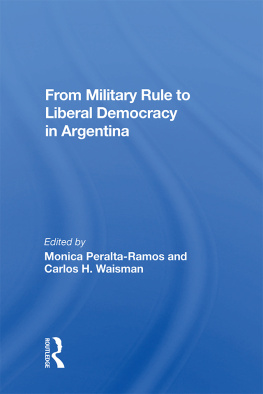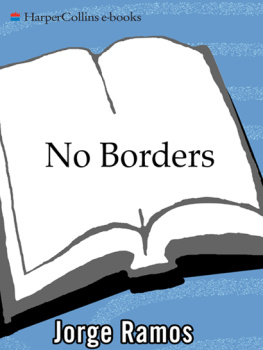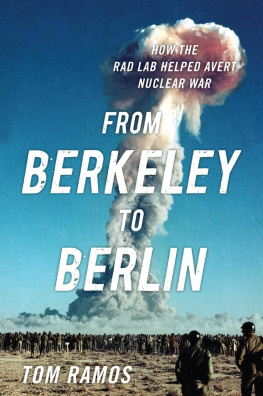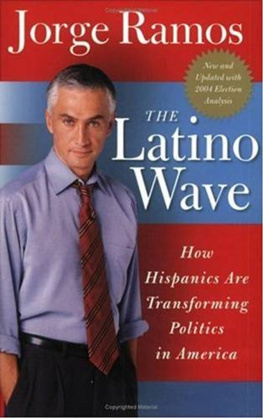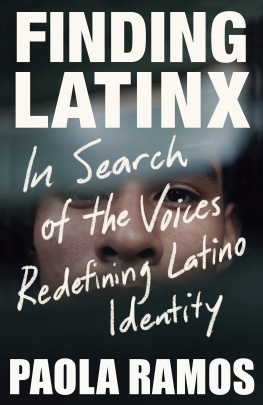ANA Y. RAMOS-ZAYAS is Valentn Lizana y Parragu Endowed Chair in Latin American Studies and professor of black and Hispanic studies at CUNYBaruch College. She is the author of National Performances: Race, Class, and Space in Puerto Rican Chicago, also published by the University of Chicago Press, and coauthor of Latino Crossings: Mexicans, Puerto Ricans, and the Politics of Race and Citizenship.
The University of Chicago Press, Chicago 60637
The University of Chicago Press, Ltd., London
2012 by The University of Chicagos
All rights reserved. Published 2012.
Printed in the United States of America
21 20 19 18 17 16 15 14 13 12 1 2 3 4 5
ISBN-13: 978-0-226-70361-9 (cloth)
ISBN-13: 978-0-226-70362-6 (paper)
ISBN-10: 0-226-70361-4 (cloth)
ISBN-10: 0-226-70362-2 (paper)
ISBN-13: 978-0-226-70363-3 (e-book)
Library of Congress Cataloging-in-Publication Data
Ramos-Zayas, Ana Y.
Street therapists : race, affect, and neoliberal personhood in Latino Newark / Ana Y. Ramos-Zayas.
p. cm.
Includes bibliographical references and index.
ISBN-13: 978-0-226-70361-9 (hardcover : alkaline paper)
ISBN-13: 978-0-226-70362-6 (paperback : alkaline paper)
ISBN-10: 0-226-70361-4 (hardcover : alkaline paper)
ISBN-10: 0-226-70362-2 (paperback : alkaline paper)
1. Latin AmericansNew JerseyNewarkSocial conditions. 2. Newark (N.J.)
Social conditions. I. Title.
F144.N69L387 2012
305.868'073074932dc23
2011034664

This paper meets the requirements of ANSI/NISO Z39.48-1992 (Permanence of Paper).
Acknowledgments
I have to confess that one of the parts of writing a book that I most look forward to is the acknowledgments section. This is also the section that I first turn to when I pick up a book, in the hope of finding out more about the author, her affiliations, her inspirations, her friendships, and whatever other chismesito might appear between the lines. Ultimately, the acknowledgements sections of books are a form of affective expression and it is from that perspective that I want to thank the many individuals and institutions that have enabled me to complete the long process of producing this manuscript.
I was at Rutgers UniversityNew Brunswick for the ten years that it took me to get to know Newark. I am grateful to the colleagues in the Department of Anthropology and the Department of Latino and Hispanic Caribbean Studies who gave me substantive feedback on various portions of this manuscript and the published articles that have emanated from this ethnographic project. In particular, I would like to thank Ulla Berg, Carlos Decena, Milagros Denis, Zaire Dinzey-Flores, Peter Guarnaccia, Aldo Lauria-Santiago, Kathy Lpez, Fran Mascia-Lees, and Edgar Rivera-Coln, as well as the administrative assistance of Ginny Caputto, Monica Licourt, Penny Murphy, Toni Napier, and Sarah OMeara-Gonzlez. At RutgersNewark, Kimberly DaCosta-Holton, Tanya Hernndez, Asela Laguna-Diaz, Clement Price, Maura Sidney, and Olga Waggenheim provided encouragement and various forms of data and guidance throughout the research process. In addition, the participants in my two graduate seminarsUrban Ethnography (spring 2004) and Race, Migration, Citizenship (spring 2006)were any professors dream students whose incisive questions and genuine curiosity sharpened my own intellectual process. The same can be said of the undergraduate students in my Latinos and Whiteness (spring 2002) and Latino Youth (spring 2008) seminars. To all of them, my gratitude.
Other groups at Rutgers also facilitated the undertaking and completion of this project, by providing financial support and scholarly space. These include the Center for the Critical Analysis of Contemporary Cultures (20034), especially Linda Bosniak; the Institute for Research on Women (20045) under the stellar leadership of Nancy Hewitt; the Bildner Fellowship (20056) administered by Isabel Nazario; the henningberg Civic Fellowship (2010); and the staff of the Center for Latino Arts and Culture.
From its inception through the fieldwork and writing stages, this project has benefited from the thematic, theoretic, and cosmetic suggestions of people who have become much more than colleagues, journal co-authors, writing buddies, long-term mentors, panel co-organizers, or conference co-participants, even though they have been that, too. Some of them are Carlos Alamo, Frances Aparicio, Aime Cox, Nicholas De Genova, Micaela di Leonardo, Virginia Domnguez, Jorge Duany, Arlie Hochschild, John Jackson, Katherine S. Newman, Suzanne Oboler, Jos Ral Perales, Sonya Ramsey, Mrida Ra, Ann Stoler, Deborah Thomas, Arlene Torres, Vilna Treitler, Ingrid Vargas, and Carlos Vargas-Ramos. T. David Brent at the University of Chicago Press also published my first book, National Performances (2003), and has been once again a delight to work with. I got some of the best recommendations for revisions from one of the two anonymous readers of this manuscript; the second reader provided mostly a much-needed ego boost. Thanks to all!
This projects intimate entanglements with the city of Newark required the energy, patience, and continuous support of many Newarkers, like my former student Melissa Delrios and her family, who introduced me to their North Newark neighbors and invited me to several hospitality breakfasts at St. Michaels Church; the teachers, staff, and students at high schools and community agencies in North Broadway and the Ironbound, who generously revealed their quotidian concerns, joys, and amazement to me; the staff at the Newark Public Library, particularly librarian extraordinaire Ingrid Betancourt, and of the New Jersey Historical Society and the Newark Museum who directed me to critical archival and media sources. Above all, such a project required the generosity of the Newark residents and street therapistsactivists, not-for-profit organization staff and workers, high school students and teachers, small-business owners, graphic artists, journalists, creative writers, spiritual leaders, beauticians, and morticianswhose strong voices and sharp analytical skills resonate throughout this volume. I cannot thank them enough because they certainly gave me more than I could ever convey or reciprocate. The anonymity codes of ethnographic research prevent me from thanking them by name, but I hope that I have done justice not only to their words but, perhaps more important, to that which is beyond semantic grasp.
Halfway through my fieldwork, I realized that, as transnational subjects, many of the interlocutors in this project developed their perspectives on Newark, affect, and race, elsewhere. Two of these elsewheres were Brazil and Puerto Rico. While most of the data that I collected in the cities of Santurce, Puerto Rico, and Belo Horizonte, Brazil, will have to wait for a future project due to space constraints with this one, I do want to thank the individuals who facilitated my ethnographic research in both places.
No Brasil, eu sou muito grata ao pessoal e os estudantes do Colegio Magno, particularmente Ronaldo Maciel e Ibsen Cunha, e da Escola Municipal Imago em Belo Horizonte, especialmente Cleide Maselli. Agradeo tambm a: Fabiano Maisonnave do jornal Folha de So Paulo; Moacyr Novaes da Universidade de So Paulo-CAMPINAS; Paula Miranda Ribeiro da Universidade Federal de Minas Gerais-Belo Horizonte e a sua famlia; Consolao Penha da Biblioteca Pblica de Belo Horizonte; e a R P Vieira pelo convite a participar na Conferncia de ABRALIC em Rio de Janeiro em agosto de 2006. Minhas boas amigas Bernadete Beserra da Universidade Federal do Cear e Paula Botelho, que mudou-se para Belo Horizonte depois de alguns anos nos Estados Unidos, leram partes deste trabalho entusiasticamente e tambm compartilharam comigo seus prprias pesquisas. Finalmente, fico agradecida aos acadmicos brasileiros nos Estados Unidos que criaram espaos interdisciplinarios importantes onde apresentei meu trabalho. Clmence Jout-Pastr e Letcia Braga organizaram a palestra de Imigrao Brasileira aos Estados Unidos em Harvard em maro de 2005, e editaram o volume subseqente que saiu da conferncia. Os membros do grupo ciberntico NEBIRG compartilharam informao muito til sobre comunidades brasileiras pelo mundo todo. Obrigadinha!

 This paper meets the requirements of ANSI/NISO Z39.48-1992 (Permanence of Paper).
This paper meets the requirements of ANSI/NISO Z39.48-1992 (Permanence of Paper).
